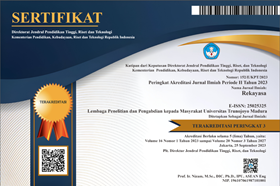Analisis Structural Equation Modelling (SEM) Efek Kepemimpinan Transformasional, Kepuasan Kerja dan Komitmen Organisasional Terhadap Kinerja Karyawan Perusahaan Pelayaran
Abstract
Keywords
Full Text:
PDF (Bahasa Indonesia)References
Abubakar, A. M., Elrehail, H., Alatailat, M. A., & Elçi, A. (2019). Knowledge management, decision-making style and organizational performance. Journal of Innovation and Knowledge, 4(2), 104–114. https://doi.org/10.1016/j.jik.2017.07.003
Advani, A. (2015). Impact of transformational and transactional leadership styles on employees’ performance of banking sector in Pakistan. Global Journal of Management and Business Research: Administration and Management, 15(5).
Akla, S., & I. (2020). The effect of organizational culture, motivation, and job satisfaction on employee performance. Dinasti International Journal of Economics, Finance & Accounting (DIJEFA), 1(4), 492–502. https://doi.org/10.33258/birci.v5i1.4320
Al-Amin, M. (2017). Transformational leadership and employee performance mediating effect of employee engagement. North South Business Review, 7(2), 28–40.
Al-Husseini, S., El Beltagi, I., & Moizer, J. (2021). Transformational leadership and innovation: the mediating role of knowledge sharing amongst higher education faculty. International Journal of Leadership in Education, 24(5), 670–693. https://doi.org/10.1080/13603124.2019.1588381
Al Harbi, J. A., Alarifi, S., & Mosbah, A. (2019). Transformation leadership and creativity. Personnel Review, 48(5), 1082–1099. https://doi.org/10.1108/PR-11-2017-0354
Amiruddin, J., & Yudiarso, A. (2023). Application of Transformational Leadership Method to Increase Job Satisfaction. Psikostudia : Jurnal Psikologi, 12, 92. https://doi.org/10.30872/psikostudia.v12i1.9749
Andreas, D. (2022). The Effect Of Motivation, Communication And Job Satisfaction On Employee Performance. International Journal of Science, Technology & Management, 3(2), 530–536. https://doi.org/10.46729/ijstm.v3i2.481
Aqila Praditya, R. (2020). Leadership, Work Motivation, Competency, Commitment and Culture: Which Influences The Performance of Quality Management Systembin Automotive Industry. Journal of Industrial Engineering & Management Research (JIEMAR), 1(1), 53–62.
Avolio, B. J., & Bass, B. M. (1995). Individual consideration viewed at multiple levels of analysis: A multi-level framework for examining the diffusion of transformational leadership. The Leadership Quarterly, 6(2), 199–218. https://doi.org/10.1016/1048-9843(95)90035-7
Bashir, A., Amir, A., Jawaad, M., & Hasan, T. (2020). Work conditions and job performance: An indirect conditional effect of motivation. Cogent Business and Management, 7(1). https://doi.org/10.1080/23311975.2020.1801961
Bass, B. M., & Riggio, R. E. (2006). Transformational Leaderhsip.
Bogler, R. (2001). The Influence of Leadership Style on Teacher Job Satisfaction. Educational Administration Quarterly - EDUC ADMIN QUART, 37, 662–683. https://doi.org/10.1177/00131610121969460
Bowling, N. A., Khazon, S., Meyer, R. D., & Burrus, C. J. (2015). Situational Strength as a Moderator of the Relationship Between Job Satisfaction and Job Performance: A Meta-Analytic Examination. Journal of Business and Psychology, 30(1), 89–104. https://doi.org/10.1007/s10869-013-9340-7
Braun, S., Peus, C., Weisweiler, S., & Frey, D. (2013). Transformational leadership, job satisfaction, and team performance: A multilevel mediation model of trust. Leadership Quarterly, 24(1), 270–283. https://doi.org/10.1016/j.leaqua.2012.11.006
Bryan, V., & Vitello-Cicciu, J. (2022). Perceptions of preceptors’ authentic leadership and final year nursing students’ self-efficacy, job satisfaction, and job performance. Journal of Professional Nursing, 41(October 2021), 81–87. https://doi.org/10.1016/j.profnurs.2022.04.003
Buchholz, W., & Eichenseer, M. (2019). Advantageous leadership in public good provision: the case of an endogenous contribution technology. Journal of Economics, 126(1), 1–17. https://doi.org/10.1007/s00712-018-0613-5
Buil, I., Martínez, E., & Matute, J. (2019). Transformational leadership and employee performance: The role of identification, engagement and proactive personality. International Journal of Hospitality Management, 77, 64–75. https://doi.org/https://doi.org/10.1016/j.ijhm.2018.06.014
Casmun., Rhian Indradewa., Syah, T. Y. R., & Fajarwati., D. (2020). Transformational Leadership Influence , Compensation , and Organizational Climate on Employee Performance with Work Motivation as Mediator Variable. Journal of Multidisciplinary Academic, 05(01), 1–7.
Çetin, F., & Aşkun, D. (2019). The effect of occupational self-efficacy on work performance through intrinsic work motivation. Management Research Review, 41(2), 186–201. https://doi.org/10.1108/MRR-03-2017-0062
Cetin, M. O., & Kinik, F. S. F. (2015). An Analysis of Academic Leadership Behavior from the Perspective of Transformational Leadership. Procedia - Social and Behavioral Sciences, 207, 519–527. https://doi.org/https://doi.org/10.1016/j.sbspro.2015.10.122
CHAO, W. U. (2023). A Study of Transformational Leadership Behavior and Employee Performance in Chinese Futures Firms. International Journal of Science and Business, 23, 22–37. https://doi.org/10.58970/IJSB.2132
Chen, C.-F. (2006). Job satisfaction, organizational commitment, and flight attendants’ turnover intentions: A note. Journal of Air Transport Management, 12(5), 274–276. https://doi.org/https://doi.org/10.1016/j.jairtraman.2006.05.001
Chi, H., Vu, T., Nguyen, H. V., & Truong, T. H. (2023a). How financial and non–financial rewards moderate the relationships between transformational leadership, job satisfaction, and job performance. Cogent Business and Management, 10(1). https://doi.org/10.1080/23311975.2023.2173850
Chi, H., Vu, T., Nguyen, H. V., & Truong, T. H. (2023b). How financial and non–financial rewards moderate the relationships between transformational leadership, job satisfaction, and job performance. Cogent Business and Management, 10(1). https://doi.org/10.1080/23311975.2023.2173850
Chirchir, R. K. (2016). Demographic Factors and Job Satisfaction: A Case of Teachers in Public Primary Schools in Bomet County, Kenya. Journal of Education and Practice, 7, 152–158.
Clifton, J. (2019). Investigating the Dark Side of Stories of “Good” Leadership: A Discursive Approach to Leadership Gurus’ Storytelling. International Journal of Business Communication, 56(1), 82–99. https://doi.org/10.1177/2329488418796603
Dana, P., Gede, supartha wayan, & Gede, R. (2012). Pengaruh Kepuasan Kerja terhadap Komitmen Organisasional dan Kinerja Karyawan Koperasi Krama Bali. E-Jurnal Manajemen Universitas Udayana, 1(2).
Dewi, N. N., & Wibowo, R. (2020). The effect of leadership style, organizational culture and motivation on employee performance. Management Science Letters, 10(9), 2037–2044. https://doi.org/10.5267/j.msl.2020.2.008
Dragos, P. (2014). Study regarding the role of motivation in the sport performance activities. Baltic Journal of Health and Physical Activity, 6. https://doi.org/10.2478/bjha-2014-0006
Eliyana, A., Ma’arif, S., & Muzakki. (2019). Job satisfaction and organizational commitment effect in the transformational leadership towards employee performance. European Research on Management and Business Economics, 25(3), 144–150. https://doi.org/10.1016/j.iedeen.2019.05.001
Emery, C. R., & Barker, K. J. (2007). The Effect of Transactional and Transformational Leadership Styles on the Organizational Commitment and Job Satisfaction of Customer Contact Personnel. Journal of Organizational Culture, Communications and Conflict, 11, 77. https://api.semanticscholar.org/CorpusID:142640183
Endang Ruswanti, A. R. R. & U. J. (2013). Aplikasi teori kebutuhan ERG Alderfer terhadap motivasi karyawan rumah sakit Islam Hidayatullah Yogyakarta. Forum Ilmiah, 10(2), 165–171.
Ezzat, A., & Ehab, M. (2019). The determinants of job satisfaction in the Egyptian labor market. Review of Economics and Political Science, 4(1), 54–72. https://doi.org/10.1108/REPS-10-2018-012
Fernet, C., Trépanier, S.-G., Austin, S., Gagné, M., & Forest, J. (2015a). Transformational leadership and optimal functioning at work: On the mediating role of employees’ perceived job characteristics and motivation. Work & Stress, 29(1), 11–31. https://doi.org/10.1080/02678373.2014.1003998
Fernet, C., Trépanier, S. G., Austin, S., Gagné, M., & Forest, J. (2015b). Transformational leadership and optimal functioning at work: On the mediating role of employees’ perceived job characteristics and motivation. Work and Stress, 29(1), 11–31. https://doi.org/10.1080/02678373.2014.1003998
Furnham, A., Eracleous, A., & Chamorro‐Premuzic, T. (2009). Personality, motivation and job satisfaction: Hertzberg meets the Big Five. Journal of Managerial Psychology, 24(8), 765–779. https://doi.org/10.1108/02683940910996789
Ghozali, I. (2012). aplikasi analisis multivariate dengan program IBM SPSS 20: Analisis Path. Badan penerbit Universitas Diponegoro.
Gorondutse, A. H., & Hilman, H. (2019). Does organizational culture matter in the relationship between trust and SMEs performance. Management Decision, 57(7), 1638–1658. https://doi.org/10.1108/MD-05-2018-0557
Güllü, B., & Coruk, A. (2022). Occupational Cynicism According to the Opinions of Teachers. International Journal of Innovative Approaches in Education, 6, 157–172. https://doi.org/10.29329/ijiape.2022.473.3
Gumah, B., Wenbin, L., & Aziabah, M. A. (2021). Supervisors’ Leadership Styles’ Influence on Foreign Teachers’ Self-Efficacy in a Cross-Cultural Work Setting: A Moderated Mediation Analysis. SAGE Open, 11(1), 2158244021994546. https://doi.org/10.1177/2158244021994546
Hair, J., Sarstedt, M., Hopkins, L., & G. Kuppelwieser, V. (2014). Partial least squares structural equation modeling (PLS-SEM). European Business Review, 26(2), 106–121. https://doi.org/10.1108/EBR-10-2013-0128
Han, Y., Park, E., & Park, S. (2019). A study on emotion-labor based emotion burnout by video, questionnaires and structural equation model. Multimedia Tools and Applications, 78(20), 28779–28803. https://doi.org/10.1007/s11042-018-6705-y
Handoyo, L. N. (2015). The Influence of Leadership Styles on Employee’s Performance Through Work Motivation (an Organizational Study at Four Hotels in Malang). Jurnal Administrasi Bisnis S1 Universitas Brawijaya, 22(1).
Hanzaee, K., & Mirvaisi, M. (2013). A survey on impact of emotional intelligence, organizational citizenship behaviors and job satisfaction on employees’ performance in Iranian hotel industry. Management Science Letters, 3(5), 1395–1402.
Harahap, & T. (2020). Pengaruh Motivasi, Disiplin, Dan Kepuasan Kerja Terhadap Kinerja Karyawan Di PT. Angkasa Pura II (Persero) Kantor Cabang Kualanamu. Maneggio: Jurnal Ilmiah Magister Manajemen, 3(1), 120–135. https://doi.org/10.30596/maneggio.v3i1.4866
Hermosilla, D., Amutio, A., da Costa, S., & Páez, D. (2016). El Liderazgo transformacional en las organizaciones: variables mediadoras y consecuencias a largo plazo. Revista de Psicologia Del Trabajo y de Las Organizaciones, 32(3), 135–143. https://doi.org/10.1016/j.rpto.2016.06.003
Hettiararchchi, H. A. H., & Jayarathna, S. (2014). The effect of employee work related attitudes on employee job performance: A study of tertiary and vocational education sector in Sri Lanka.
Inceoglu, I., Segers, J., & Bartram, D. (2012). Age-related differences in work motivation. Journal of Occupational and Organizational Psychology, 85(2), 300–329. https://doi.org/10.1111/j.2044-8325.2011.02035.x
Judge, T. A., Thoresen, C. J., Bono, J. E., & Patton, G. K. (2011). The Volatility of Bitcoin. The Job Satisfaction–Job Performance Relationship: A Qualitative and Quantitative Review., 127(3), 376–407. https://doi.org/10.2139/ssrn.2921082
Kertabudi, I. S. (2021). Effect of Organizational Commitment and Job Satisfaction on Employees Performance at Cibabat Hospital, Cimahi City West Java. Universal Journal, 8(3).
Keskes, I., Sallan, J., Simo, P., & Fernandez, V. (2018). Transformational leadership and organizational commitment: Mediating role of leader-member exchange. Journal of Management Development, 37, 0. https://doi.org/10.1108/JMD-04-2017-0132
Khalid, K. (2020). The Impact of Managerial Support on the Association Between Pay Satisfaction, Continuance and Affective Commitment, and Employee Task Performance. SAGE Open, 10(1), 2158244020914591. https://doi.org/10.1177/2158244020914591
Kharismasyah, A. Y., & Putra, S. K. (2020). Pengaruh Kepemimpinan Transformasional, Iklim Organisasi, Kepuasan Kerja Dan Komitmen Afektif Terhadap Organizational Citizenship Behavior (Ocb) Pada Pegawai Pt. Pdam Tirta Wijaya. Jurnal Manajemen Vol 10 N0 2 (2020), 10(2), 86–98.
Koopmans, L., Bernaards, C., Hildebrandt, V., Van Buuren, S., Van Der Beek, A. J., & de Vet, H. C. w. (2012). Development of an individual work performance questionnaire. International Journal of Productivity and Performance Management, 62(1), 6–28. https://doi.org/10.1108/17410401311285273
Kristine, E. (2017). Pengaruh kepuasan kerja dan komitmen organisasi terhadap kinerja melalui motivasi kerja pegawai alih daya (outsourcing) di PT. Mitra Karya Jaya Sentosa. Jurnal EKSEKUTIF, 14(2), 384–401.
Lai, F.-Y., Tang, H.-C., Lu, S.-C., Lee, Y.-C., & Lin, C.-C. (2020). Transformational Leadership and Job Performance: The Mediating Role of Work Engagement. SAGE Open, 10(1), 2158244019899085. https://doi.org/10.1177/2158244019899085
Laily, N. (2017). Pengaruh Gaya Kepemimpinan Transformasional dan Komitmen Organisasi Terhadap Kinerja Karyawan (Studi Kasus Karyawan Bagian Kantor pada PT. Agung Automall Pekanbaru). Jom FISIP, 4(2), 1–10.
Letsoin, V., & Ratnasari, S. (2020). PENGARUH KETERLIBATAN KARYAWAN, LOYALITAS KERJA DAN KERJASAMA TIM TERHADAP KINERJA KARYAWAN. JURNAL DIMENSI, 9, 17–34. https://doi.org/10.33373/dms.v9i1.2316
Liu, X., Zheng, X., Lee, B. Y., Yu, Y., & Zhang, M. (2023). COVID-19 and employee job performance trajectories: The moderating effect of different sources of status. Journal of Vocational Behavior, 142, 103862. https://doi.org/https://doi.org/10.1016/j.jvb.2023.103862
Luthans, F., & Thomas, L. T. (2012). The Relationship between Age and Job Satisfaction: Curvilinear Results from an Empirical Study – A Research Note. Personnel Review, 18(1), 23–26. https://doi.org/10.1108/00483488910133350
Mangkunegara, A. A. A. P., & Huddin, M. (2016). The Effect of Transformational Leadership and Job Satisfaction on Employee Performance. Universal Journal of Management, 4(4), 189–195. https://doi.org/10.13189/ujm.2016.040404
Meyer, J. P., & Allen, N. (1993). Commitment to Organizations and Occupations : Extension and Test of a Three-Component Conceptualization. Journal of Applied Psychology, 78, 538–551. https://doi.org/10.1037/0021-9010.78.4.538
Mosadeghrad, A. M. (2003). Principles of health care administration. Dibagran Tehran, Tehran.
Nadeak, B., & Naibaho, L. (2020). Motivation and hrm factors relation to the employee loyalty. Polish Journal of Management Studies, 22(2), 261–276. https://doi.org/10.17512/pjms.2020.22.2.18
Napitupulu, D. (2018). Pengaruh Kepemimpinan Transformasional dan Komitmen Organisasi Terhadap Organizational Citizenship Behavior (OCB) ( Studi Pada Perawat Rumah Sakit Puri Husada di Tembilahan). Administrasi Bisnis, 5(1), 1–15.
Navas, S., & Vijayakumar, M. (2018). Emotional Intelligence: A Review of Emotional Intelligence Effect on Organizational Commitment, Job Satisfaction and Job Stress. International Journal of Advanced Scientific Research & Development (IJASRD), 5, 1–7. https://doi.org/10.26836/ijasrd/2018/v5/i6/50602
Nguni, S., Sleegers, P., & Denessen, E. (2006). Transformational and Transactional Leadership Effects on Teachers’ Job Satisfaction, Organizational Commitment, and Organizational Citizenship Behavior in Primary Schools: The Tanzanian case. 17, 145–177. https://doi.org/10.1080/09243450600565746
Novita, & Bambang Swasto, S. (2014). Pengaruh Kepuasan Kerja dan Kompensasi terhadap Kinerja Karyawan (Studi pada PT . Telekomunikasi Indonesia , Tbk Witel Jatim Selatan , Malang ). Jurnal Administrasi Bisnis (JAB), 34(1), 38–46.
Novita, Ruhana, B. S. S. I., & Malang, F. I. A. U. B. (2016). TERHADAP KINERJA KARYAWAN ( Studi pada PT . Telekomunikasi Indonesia , Tbk Witel Jatim Selatan , Malang ). Jurnal Administrasi Bisnis (JAB), 34(1), 38–46.
Nugroho, S. H., Bandono, A., & Suharyo, O. S. (2021). the Effect of Job Satisfaction and Employee Performance To the Company’S Motivation and Leadership Style (Study of Human Resource Management Literature). Sttal Postgraduate-International Conference, 5, 1–10.
Paais, M., & Pattiruhu, J. R. (2020). Effect of Motivation, Leadership, and Organizational Culture on Satisfaction and Employee Performance. Journal of Asian Finance, Economics and Business, 7(8), 577–588. https://doi.org/10.13106/JAFEB.2020.VOL7.NO8.577
Paracha, M. U., Qamar, A., Mirza, A., Hassan, I., & Waqas, H. (2012). Impact of leadership style (transformational & transactional leadership) on employee performance & mediating role of job satisfaction. Study of private school (educator) in Pakistan. Global Journal of Management and Business Research, 12(4), 55–64.
Piccolo, R. F., & Colquitt, J. A. (2006). Transformational Leadership and Job Behaviors: The Mediating Role of Core Job Characteristics. Academy of Management Journal, 49(2), 327–340. https://doi.org/10.5465/amj.2006.20786079
Purba, K., & Sudibjo, K. (2020). The Effects Analysis of Transformational Leadership, Work Motivation and Compensation on Employee Performance in PT. Sago Nauli. Budapest International Research and Critics Institute (BIRCI-Journal): Humanities and Social Sciences, 3(3), 1606–1617. https://doi.org/10.33258/birci.v3i3.1091
Putra, A. S., Waruwu, H., Masduki Asbari, Dewiana Novitasari, & Agus Purwanto. (2021). Leadership in the Innovation Era : Transactional or Transformational Style ? International Journal of Social and Management Studies (IJOSMAS), 01(01), 89–96. https://www.ijosmas.org/index.php/ijosmas/article/view/10%0Ahttps://www.ijosmas.org/index.php/ijosmas/article/download/10/10
Putri, N., & Meria, L. (2022). The Effect of Transformational Leadership on Employee Performance Through Job Satisfaction and Organizational Commitment. IAIC Transactions on Sustainable Digital Innovation (ITSDI), 4, 8–21. https://doi.org/10.34306/itsdi.v4i1.565
Radne Rimba Putri, I., & Maria Rosa, E. (2016). Analisis Motivasi Kerja Perawat di Ruang Rawat Inap RS PKU Muhammadiyah Yogyakarta Unit II. Jurnal Ners Dan Kebidanan Indonesia, 3(2), 82. https://doi.org/10.21927/jnki.2015.3(2).82-90
Riatmaja, D., Shaddiq, S., & Wulandari, W. (2023). The Influence of Organizational Culture on Employee Performance Mediated by Job Satisfaction and Organizational Commitment.
Robbins, S., Judge, T. A., Millett, B., & Boyle, M. (2013). Organisational behaviour. Pearson Higher Education AU.
Roberts, J. A., & David, M. E. (2020). Boss phubbing, trust, job satisfaction and employee performance. Personality and Individual Differences, 155, 109702. https://doi.org/https://doi.org/10.1016/j.paid.2019.109702
Rosa, N. T., & Ancok, D. (2020). the Influence of Spiritual Leadership on Affective Commitment Through Calling and Membership (a Study At Zainab Mother and Child Hospital in Pekanbaru). Journal of Leadership in Organizations, 2(1), 18–29. https://doi.org/10.22146/jlo.53849
Sari, I. K., & Saputra, F. (2022). the Effect of Work Stress and Emotional Intelligence Mediation on Performance. REVENUE: Jurnal Manajemen Bisnis Islam, 3(2), 285–302. https://doi.org/10.24042/revenue.v3i2.14249
Shafique Khan, M. A., Jianguo, D., Mann, A., Saleem, S., Boamah, K. B., Javed, U., & Usman, M. (2019). Rejuvenating the concept of work alienation through job demands-resources model and examining its relationship with emotional exhaustion and explorative and exploitative learning. Psychology Research and Behavior Management, 12, 931–941. https://doi.org/10.2147/PRBM.S204193
Shao, H., Fu, H., Ge, Y., Jia, W., Li, Z., & Wang, J. (2022). Moderating Effects of Transformational Leadership, Affective Commitment, Job Performance, and Job Insecurity. Frontiers in Psychology, 13(May). https://doi.org/10.3389/fpsyg.2022.847147
Siregar, Z. (2022). Extrinsic Motivation and Organizational Commitment : A Literarure Review. International Journal of Business, Technology and Organizational Behavior (IJBTOB), 2, 397–402. https://doi.org/10.52218/ijbtob.v2i4.214
Sonnentag, S., & Frese, M. (2005). Performance Concepts and Performance Theory (pp. 1–25). https://doi.org/10.1002/0470013419.ch1
Syah, T. Y. R., Anindita, R., & Kishen. (2020). The Transformational Leadership Effect on Job Satisfaction and Job Performance. Journal of Multidisciplinary Academic, 4(1), 47–51.
Tse, H. H. M., & Chiu, W. C. K. (2014). Transformational leadership and job performance: A social identity perspective. Journal of Business Research, 67(1), 2827–2835. https://doi.org/https://doi.org/10.1016/j.jbusres.2012.07.018
Usikalu, O., Ogunleye, A. J., & Effiong, J. (2015). Organizational trust, job satisfaction and job performance among teachers in Ekiti state, Nigeria. British Open Journal of Psychology, 1(1), 1–10.
Viswesvaran, C., & Ones, D. S. (2000). Perspectives on Models of Job Performance. International Journal of Selection and Assessment, 8(4), 216–226. https://doi.org/10.1111/1468-2389.00151
Walean, R., Koyongian, Y., & Sabudu, D. (2022). An Analysis of the Effect of Transformational Leadership on Employees Job Satisfaction and Employees Performance. Tadbir : Jurnal Studi Manajemen Pendidikan, 6, 241. https://doi.org/10.29240/jsmp.v6i2.4738
Wang, X., Ma, L., & Zhang, M. (2014). Transformational leadership and agency workers’ organizational commitment: The mediating effect of organizational justice and job characteristics. Social Behavior and Personality: An International Journal, 42(1), 25–36.
Widarto, I., & Anindita, R. (2018). Analysis of The Effect of Motivation, Job Satisfaction, and Organizational Commitment on Performance. Iarjset, 5(9), 21–29. https://doi.org/10.17148/iarjset.2018.594
Widayanto, T., & Nugroho, S. H. (2022). The Influence of Work Discipline, Organizational Culture and Competence on Employee Performance. International Journal of Business, Management and Economics, 3(4), 371–381. https://doi.org/10.47747/ijbme.v3i4.906
Yusuf, M., & Suwardana, H. (2023). Relationship Motivation and Job Satisfaction on Employee Productivity. INNOVATION RESEARCH JOURNAL, 4, 44. https://doi.org/10.30587/innovation.v4i1.5635
Yusup, A., & Maulani, I. (2023). The Influence of Transformational Leadership on Employee Motivation. Devotion Journal of Community Service, 4, 798–802. https://doi.org/10.36418/devotion.v4i3.441
DOI
https://doi.org/10.21107/rekayasa.v17i1.25351Metrics
Refbacks
- There are currently no refbacks.
Copyright (c) 2024 Sukmo Hadi Nugroho, Thomas Aquinas Kurniawan

This work is licensed under a Creative Commons Attribution-ShareAlike 4.0 International License.
























